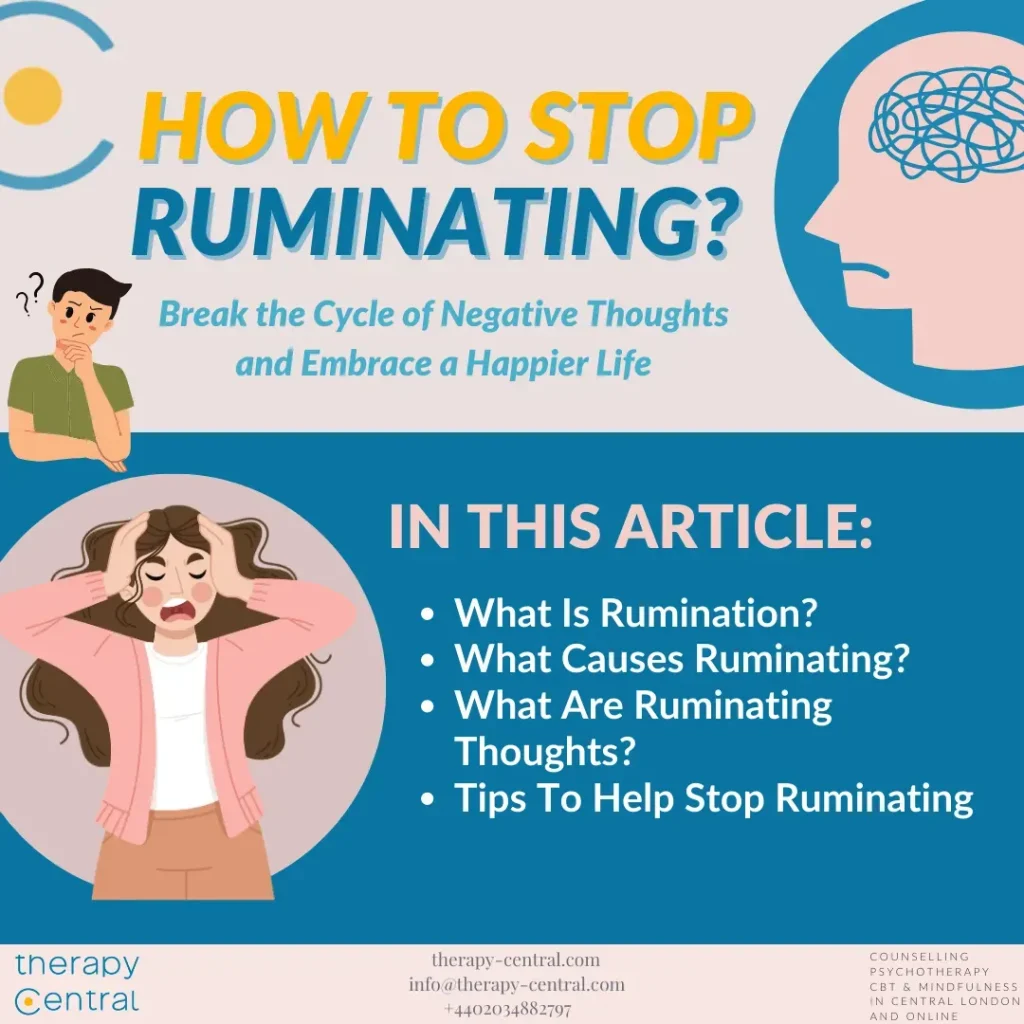If you find yourself stuck in a cycle of negative thoughts, it’s time to learn how to stop ruminating. This persistent overthinking can drain your energy and contribute to anxiety and depression. By utilizing effective rumination techniques, such as cognitive-behavioral therapy (CBT) methods or grounding techniques for anxiety, you can regain control over your mind. These strategies help break the repetitive thought patterns that fuel rumination, allowing you to focus on the present instead. Whether through mindfulness practices or simple journaling, overcoming rumination is within reach and can significantly improve your overall well-being.
Are you feeling overwhelmed by your thoughts and struggling to break free from mental loops? The process of getting trapped in a cycle of constant worry and self-reflection is often referred to as overthinking or obsessive thinking. Understanding how to cultivate mindfulness and using practical grounding techniques can serve as an antidote to this mental trap. By identifying effective strategies, such as journaling or engaging in physical activities, you can disrupt these thought patterns. Learning to make sense of your emotions and thoughts in this way can lead you toward a clearer, more serene state of mind.
Understanding the Nature of Rumination
Rumination involves an excessive focus on negative thoughts or situations, often leading to heightened anxiety and depression. This cycle can be challenging to break because it engages the brain’s survival response, causing individuals to dwell on perceived threats or failures instead of moving forward. Understanding this behavior is the first step in how to stop ruminating effectively.
By recognizing the patterns of rumination, individuals can adopt strategies to shift their focus away from these thoughts. Cognitive Behavioral Therapy (CBT) provides techniques to identify and challenge these negative thought patterns, promoting healthier thinking habits. Employing rumination techniques like cognitive restructuring can help rewrite detrimental narratives.
Effective Techniques to Stop Ruminating
To stop ruminating, implementing grounding techniques can be profoundly effective. For instance, the 5-4-3-2-1 method helps individuals become aware of their present environment by engaging their senses. Identifying five things they can see, four they can touch, three they can hear, two they can smell, and one they can taste effectively pulls their focus away from repetitive thoughts.
Additionally, mindfulness meditation can serve as a strong counter to ruminating thoughts. It encourages practitioners to observe their thoughts without judgment, creating a mental distance from them. This approach validates the existence of the thoughts without allowing them to take control, ultimately aiding in overcoming rumination.
Grounding Techniques for Managing Anxiety and Rumination
Grounding techniques are essential tools for managing anxiety and can play a pivotal role in stopping rumination. Techniques such as deep breathing exercises evoke relaxation responses in the body, helping to break the cycle of anxious thoughts. Simple strategies, like focusing on the present moment or engaging in physical activity, can calm the mind and refocus thoughts.
Another effective grounding exercise is sensory engagement, where individuals actively make use of their senses to reconnect with the present. This can involve touching different textures or even immersing oneself in nature to foster a sense of calm. By practicing these grounding techniques, people can reduce anxiety levels and minimize the tendency to ruminate.
How CBT Can Help Break the Cycle of Rumination
Cognitive Behavioral Therapy (CBT) is a highly effective method for addressing rumination and anxiety. CBT techniques allow individuals to identify and challenge distorted thinking patterns that contribute to their ruminative thoughts. Through structured sessions, therapists guide patients to understand the relationship between their thoughts, feelings, and behaviors.
Additionally, CBT equips individuals with practical tools to change their thought patterns. By engaging in activities like thought recording or identifying cognitive distortions, clients learn to reframe negative experiences. This transformation is essential for overcoming rumination, leading to healthier coping mechanisms and better emotional regulation.
Practical Steps to Overcome Rumination
Overcoming rumination is often a gradual process that requires consistent effort. One practical step is to set aside dedicated time for problem-solving or journaling about ruminative thoughts. By allowing a specific period to address worries, individuals can limit their intrusiveness during other times of the day.
Moreover, incorporating regular physical exercise into daily routines can greatly alleviate ruminative thoughts. Exercise releases endorphins and reduces stress, making it easier to manage anxiety. Simple activities like walking or yoga can stimulate both the body and mind, fostering a more positive outlook.
The Role of Nutrition in Reducing Rumination
Nutrition can significantly impact mental health and influence rumination patterns. Foods rich in Omega-3 fatty acids, antioxidants, and vitamins can improve brain function and mood regulation. Incorporating items such as fatty fish, nuts, and leafy greens into your diet optimally supports emotional well-being.
Conversely, avoiding excessive sugar and caffeine can also help reduce ruminative thinking. These substances can contribute to mood swings and increase anxiety, thus exacerbating rumination. A balanced diet not only supports physical health but also creates a foundation for better mental clarity and emotional balance.
Emotional Regulation as a Strategy Against Rumination
Emotional regulation plays a crucial role in combating rumination. Learning to manage emotions effectively can prevent spiraling into negative thought loops. Techniques such as mindfulness and cognitive reappraisal can empower individuals to accept their feelings without judgment, reducing the compulsion to ruminate.
Practicing emotional labeling, where individuals identify and name their feelings, can further enhance emotional intelligence. By recognizing the language of emotions, individuals are better equipped to address underlying issues rather than getting stuck in cycles of rumination.
Building a Supportive Environment to Stop Ruminating
Creating an environment conducive to mental wellness is essential in stopping rumination. Surrounding oneself with supportive friends and family can foster open communication about feelings and thoughts. Emotional support systems not only provide understanding but also encourage active engagement in life, which is crucial for breaking the patterns of rumination.
Additionally, engaging with support groups or professional counseling can offer valuable perspectives on overcoming difficulties. Sharing experiences with others who face similar challenges can diminish feelings of isolation and promote a sense of belonging, ultimately impacting one’s capacity to address ruminative thoughts effectively.
Incorporating Mindfulness into Daily Life
Incorporating mindfulness practices into everyday routines can significantly curb ruminative thoughts. Simple techniques such as mindful breathing or awareness meditation can enhance one’s ability to remain in the present moment, breaking the cycle of overthinking. Activities like mindful eating, or paying close attention to the taste and texture of food, can also draw focus away from negative thoughts.
Moreover, dedicating time to mindfulness not only reduces rumination but promotes overall well-being. Regular practice can lead to a more profound sense of peace and acceptance, allowing individuals to respond to life’s challenges with resilience rather than fear, thus minimizing the urge to ruminate.
Understanding the Necessity of Professional Help
While self-help techniques are valuable, it is sometimes necessary to seek professional assistance for persistent rumination and anxiety. Mental health professionals can offer tailored strategies and support that align with an individual’s unique experience. Therapists may also introduce more structured approaches, such as dialectical behavior therapy (DBT), which can effectively address emotional dysregulation.
Emphasizing the importance of reaching out for help when needed is crucial. Acknowledging that it’s okay to feel overwhelmed can be the first step toward healing. Ultimately, combining self-help with professional guidance can create a comprehensive plan for overcoming rumination and cultivating a healthier mindset.
Frequently Asked Questions
How to stop ruminating effectively?
To stop ruminating, practice grounding techniques, such as deep breathing exercises or the 5-4-3-2-1 method. Engage your senses by focusing on your surroundings and remind yourself of the present moment. Journaling can also help, allowing you to express and process your thoughts instead of letting them spiral.
What are some effective techniques for overcoming rumination?
Effective techniques for overcoming rumination include mindfulness practices like meditation, engaging in physical activity, and using cognitive behavioral therapy (CBT) strategies. Identify triggers and challenge negative thoughts calmly, replacing them with constructive reflections to break the ruminative cycle.
Can CBT for rumination really help manage intrusive thoughts?
Yes, CBT for rumination is an effective approach. It helps identify and modify negative thought patterns that contribute to rumination. By learning new cognitive strategies, you can redirect your thoughts and focus on problem-solving rather than dwelling on distressing ideas.
What are grounding techniques for anxiety and stopping ruminating thoughts?
Grounding techniques for anxiety include sensory exercises like focusing on textures, sounds, or smells, along with deep breathing and mindfulness. These methods stabilize your mental state and bring attention back to the present, mitigating the tendency to ruminate.
How can music help in stopping ruminating thoughts?
Music can serve as a powerful tool to stop ruminating thoughts by providing a distraction and guiding emotional expression. Listening to calming melodies or upbeat tracks can shift your mood and help break the cycle of negative thinking, facilitating a more positive mental state.
| Key Points | Details |
|---|---|
| Understanding Rumination | Strongly related to emotional distress and often involves excessive dwelling on thoughts. |
| Grounding Techniques | Methods like 5-4-3-2-1, deep breathing, and journaling to break the cycle of rumination. |
| Stay Active | Gentle movement and outdoor activities can help alleviate ruminating thoughts. |
| Professional Help | Seeking therapy can provide additional support and coping strategies for rumination. |
| Nutrition’s Role | Foods like omega-3s, magnesium, and probiotics help support brain health and mood. |
| Magic Pills | Certain medications may help reduce ruminating thoughts, but are not a fix-all solution. |
Summary
To stop ruminating, it’s essential to employ practical grounding techniques and consider professional support. Rumination can greatly affect your emotional well-being, and there are effective strategies to manage these persistent thoughts. Engaging in mindful activities, focusing on the present moment, and maintaining a balanced diet can foster better mental health. Embracing these methods empowers individuals to reclaim their peace of mind, enabling them to break the cycle of obsessive thinking.



